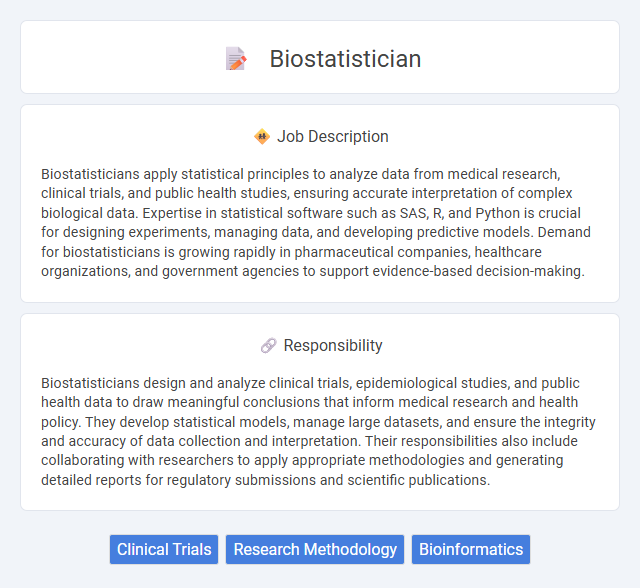
Biostatisticians apply statistical principles to analyze data from medical research, clinical trials, and public health studies, ensuring accurate interpretation of complex biological data. Expertise in statistical software such as SAS, R, and Python is crucial for designing experiments, managing data, and developing predictive models. Demand for biostatisticians is growing rapidly in pharmaceutical companies, healthcare organizations, and government agencies to support evidence-based decision-making.
Individuals with strong analytical skills and a passion for data interpretation are likely to be well-suited for a biostatistician role. Those comfortable working with complex statistical software and who enjoy collaborative research environments may find this career particularly fitting. People who prefer routine tasks or avoid quantitative challenges might find the demands of a biostatistician position less suitable.
Qualification
Biostatisticians typically require a master's degree or doctorate in biostatistics, statistics, or a related field to analyze complex biological data effectively. Proficiency in statistical software such as SAS, R, or Python is essential for designing experiments, interpreting clinical trial results, and supporting medical research. Strong analytical skills and a solid understanding of epidemiology and clinical research methodologies are critical for success in this role.
Responsibility
Biostatisticians design and analyze clinical trials, epidemiological studies, and public health data to draw meaningful conclusions that inform medical research and health policy. They develop statistical models, manage large datasets, and ensure the integrity and accuracy of data collection and interpretation. Their responsibilities also include collaborating with researchers to apply appropriate methodologies and generating detailed reports for regulatory submissions and scientific publications.
Benefit
Biostatisticians likely enhance medical research by applying statistical methods to analyze complex data, improving the accuracy of study outcomes. Their expertise probably contributes to better public health decisions and more effective clinical trials, leading to advancements in disease prevention and treatment. Working in this role may offer opportunities for collaboration with interdisciplinary teams and involvement in impactful health projects.
Challenge
The role of a biostatistician likely involves the challenge of analyzing complex biological data while ensuring statistical integrity. They probably face difficulties in designing experiments that account for variability in biological systems and managing large datasets with missing or inconsistent information. The need to communicate intricate statistical results to non-experts may also present ongoing obstacles.
Career Advancement
Biostatisticians with advanced skills in data analysis software and epidemiological methods often progress to senior research roles or leadership positions within pharmaceutical companies, healthcare organizations, and government agencies. Gaining expertise in machine learning, clinical trial design, and regulatory compliance can significantly enhance career growth opportunities. Pursuing certifications such as Certified Biostatistician (CB) and advanced degrees like a Ph.D. in Biostatistics also contribute to accelerated advancement and higher earning potential.
Key Terms
Clinical Trials
Biostatisticians specializing in clinical trials design experiments, develop statistical analysis plans, and analyze data to assess the safety and efficacy of new treatments. They apply rigorous statistical methodologies to ensure the validity and reliability of trial results, supporting regulatory submissions and medical decision-making. Expertise in biostatistical software like SAS and R, along with knowledge of Good Clinical Practice (GCP) guidelines, is essential for accurate data interpretation and compliance.
Research Methodology
Biostatisticians specialize in designing research methodologies that ensure accurate collection and analysis of biomedical data, enabling reliable conclusions in clinical trials and epidemiological studies. They apply advanced statistical techniques to develop models that address complex health questions while controlling for confounding variables and biases. Expertise in research methodology allows biostatisticians to optimize study designs, including randomized control trials and longitudinal studies, enhancing the validity and reproducibility of scientific findings in medical research.
Bioinformatics
Biostatisticians specializing in bioinformatics analyze complex biological data using advanced statistical methods and computational tools. They develop algorithms and models to interpret genomic, proteomic, and clinical datasets, facilitating insights into disease mechanisms and drug development. Proficiency in programming languages like R, Python, and knowledge of high-throughput sequencing technologies are essential for success in this field.
 kuljobs.com
kuljobs.com